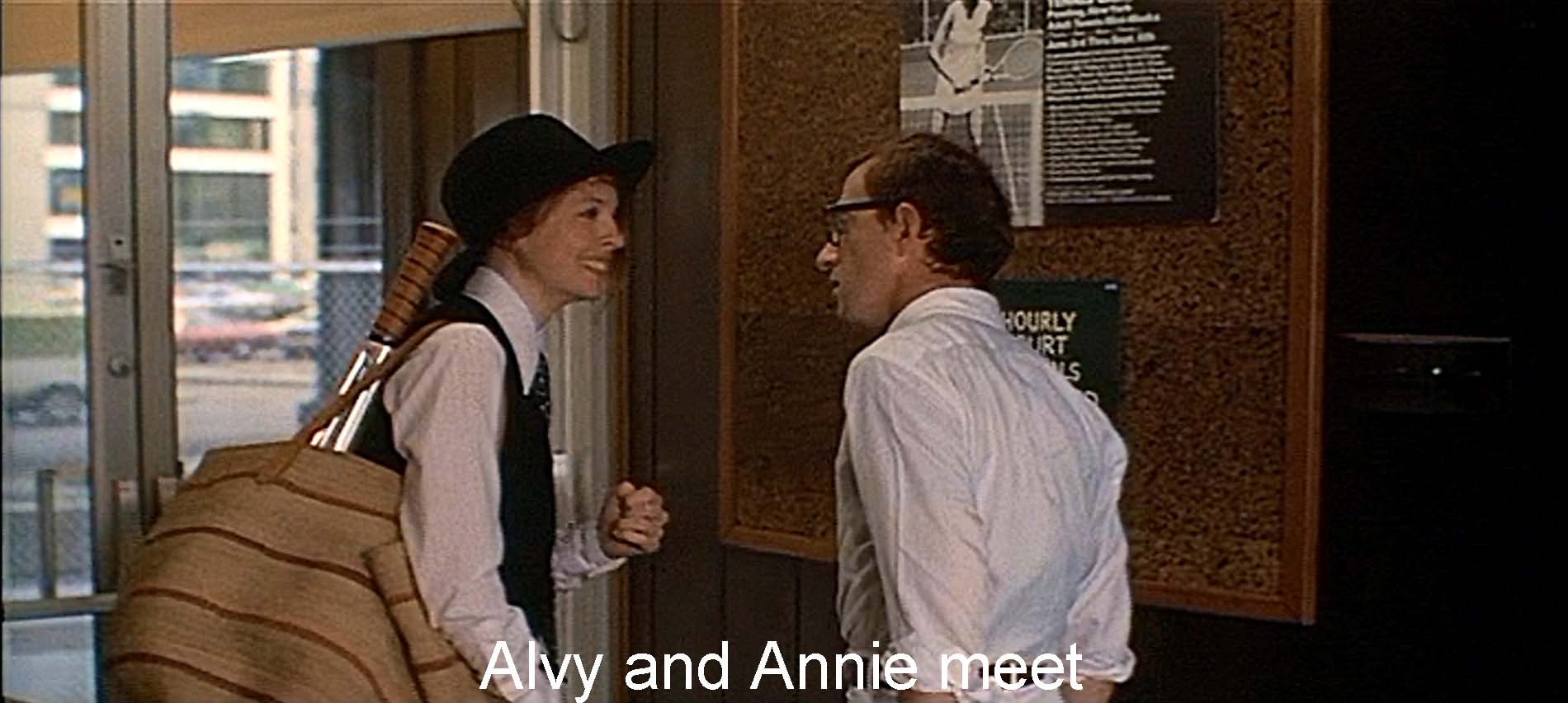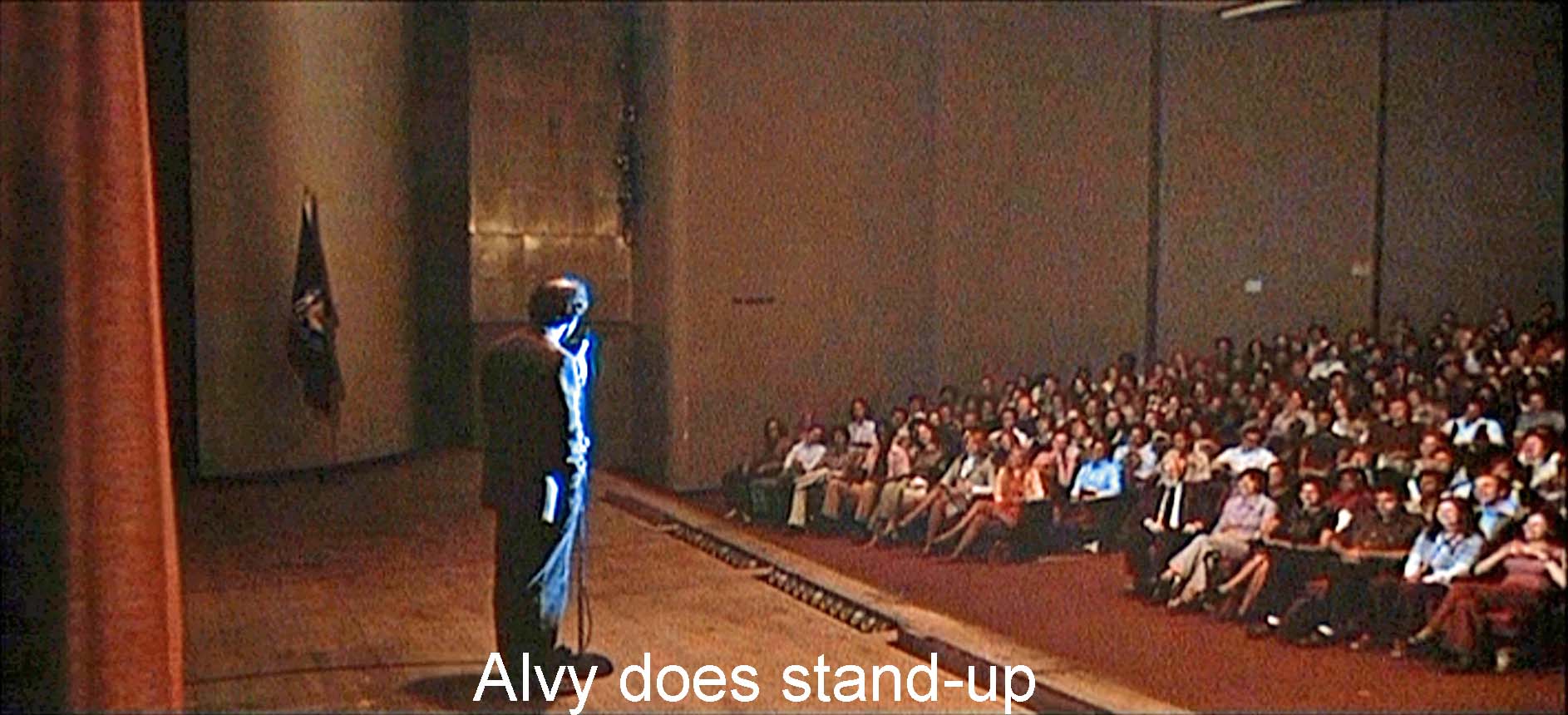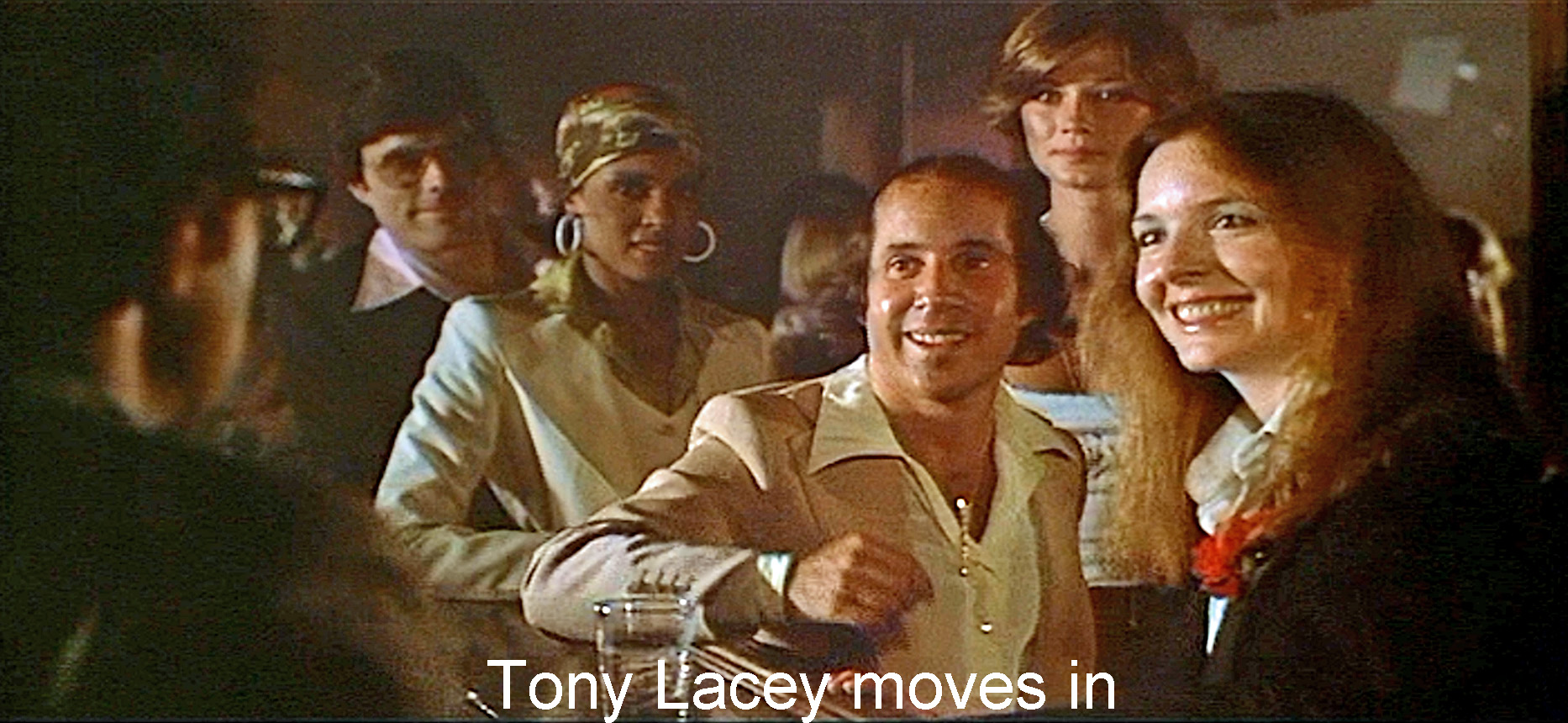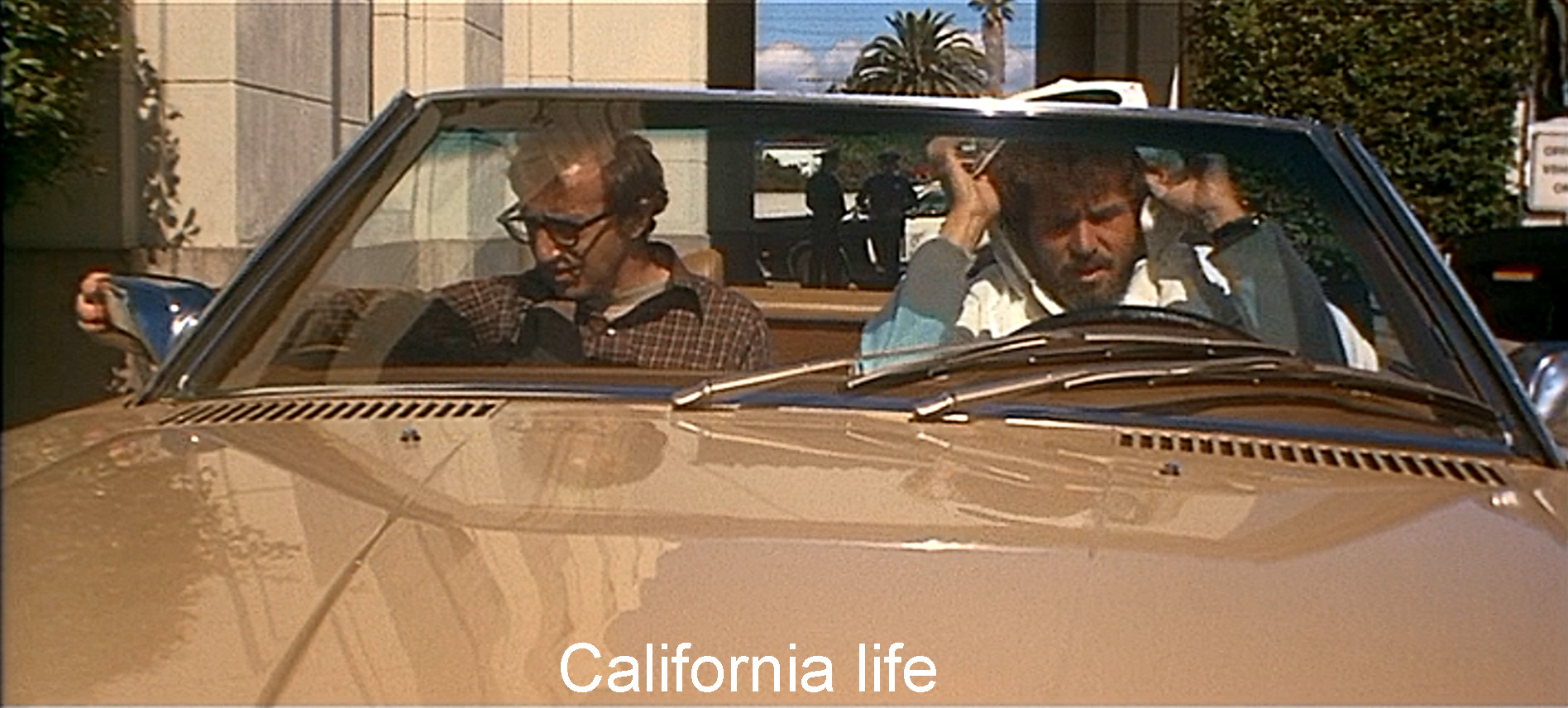It’s astonishing that this film ever got made. When Allen brought his raw footage to the editor, Ralph Rosenblum, he had shot 50 hours’ worth of film or 31 times the length of the final movie. (A normal shooting ratio is 6-10 times.) Rosenblum, in his memoir, called it “an untitled and chaotic collection of bits and pieces that seemed to defy continuity, bewilder its creators, and, of all Allen’s films, [held] the least promise for popular success.” Allen had things like a Garden of Eden sequence, a jailhouse joke-telling session, a tour of the nine levels of Hell, a Gestapo questioning, and a basketball game with Kafka, Nietzsche, and Kierkegaard as players as well as some regular Knicks.
Together the two filmmakers threw out this and that until, gradually, the story of Alvy Singer (played by Woody Allen) and Annie Hall (Diane Keaton) emerged from the thicket, presumably the same kind of thicket as Woody Allen’s early farces. With this film Allen left those behind him. This film marks the end of his first period of filmmaking, and the beginning of a series of films focused on relationships, some funny, some quite solemn.
The film that resulted from this drastic editing is as tight a film as I know and one of the most complex. It bristles with themes, developed in subtle rhymes and repetitions, all bound together, as I understand Annie Hall, by one over-arching idea. This is a sad movie, but a comedy: we are to laugh at the way we humans live in contradictions and how painful that is.
One, obviously, is sex. Alvy Singer and his buddy Rob (Tony Roberts) constantly prowl for available women and, much of the time, find them. Rob leaves New York and moves to bland, clean, guilt-free L.A. (which he loves). There he can romp with the mathematical combinations possible with 16-year-old identical twins. (Think powers of two.) But Alvy, while he finds enough women, even marrying two of them, has trouble. Sometimes he seems to make love successfully. At other times as Pam, the Rolling Stone Reporter (Shelly Duval) says, making love with him is “Kafkaesque.” In the best psychoanalytic tradition, Alvy is conflicted. So is Annie Hall: she can only make love after smoking pot.
Psychoanalysis runs all through this film in Alvy’s and later Annie’s references to “my analyst.” Telling one of the opening jokes, Alvy attributes it to Freud, and the final joke of the film gives us a psychiatrist. Alvy gets Annie to see an analyst, and then he gives us a split-screen of the two analyses. On the left side of the screen, Annie Hall goes to her up-to-date analyst who seems really capable. Annie comes home with a first-rate interpretation of a dream. On the right side of the screen, Alvy continues his 15-year analysis with an old-line, ponderous Freudian, which seems to be going nowhere. He jokes to Annie Hall’s uncomprehending family, “Pretty soon when I lie down on his couch, I won’t have to wear the lobster bib.”
Food also runs through this film. The film opens and closes with jokes about food. We see lobsters, treif in the Jewish tradition, forbidden, here seen three times and mentioned four. We see Annie mess up a perfectly good New York pastrami sandwich with mayonnaise and lettuce-and-tomato (ugh!). We see stereotypical foods, the brisket at Alvy’s family’s raucous dinner, the Easter ham (also treif) at the Halls’ genteel, gentile, hyper-WASP dinner, and the dreadful alfalfa sprouts and mashed yeast at the Los Angeles health food eatery.
Foods like pastrami and Easter ham and alfalfa sprouts form part of the stereotypes of New York, Los Angeles, and the Midwest, and Allen makes jokes about stereotypes constantly in this picture. Annie hails from Chippewa Falls, Wisconsin, where people say “neat.” And they surely are: in the Hall family, Colleen Dewhurst (in too short a part) is the mother, Donald Symington the father, and Helen Ludlam is bigoted Grammy Hall. They are as WASP a crowd as you’ll ever meet. In another stereotype, they have prototypical WASP problems, drinking, ethnic prejudices, excessive civility, and a bit of mishegaas in brother Duane’s suicidal fantasies (a marvelous bit by Christopher Walken).
Alvy also stereotypes Allison (Carol Kane) who becomes his first wife: “You’re like a New York Jewish, left-wing, liberal Intellectual, Central Park West, Brandeis University, the socialist summer camps, and the father with the Ben Shahn drawings, right?” To which she sarcastically responds, “I love being reduced to a cultural stereotype.” Alvy confesses, “I’m a bigot, you know, but for the left.” Yes, he is, and he makes politically incorrect jokes constantly about Jews, the kind only a Jew can safely make.
The third big stereotype is Alvy’s view of Los Angeles and Hollywood, “munchkin land.” He sees L.A.—and the movie portrays it—as mindless, devoid of culture, totally hedonistic, and sexually promiscuous (and Alvy, for all his sexual efforts, seems uneasy about that—one of his conflicts).
New York and L.A. This contrast between a stereotyped New York and a stereotyped Los Angeles cuts deeper, though. New York, Allen portrays as intellectual. People read books, serious books. Annie complains that all the books Alvy bought for her have “death” in the titles. Los Angeles is devoted to dumb movies, giving awards, television, and the phony laugh track. L.A. stands for what Alvy (Allen?) sees as the vapid culture of the 1970s and beyond. New York stands for an older tradition, the life of the mind, of a social conscience, represented, say, by the New York Intellectuals of the ’50s and early ’60s, “the Partisan Review crowd.”
In another theme that runs through many of his films, Alvy is Pygmalion (as many critics have pointed out). He wants to create Annie, to teach her and introduce this naif from Chippewa Falls to his New York culture of sophistication, cosmopolitanism, seriousness, tortured sex, guilt—and pastrami. And he succeeds. She matures as an artist and as a person to the point where, in her dream, she can realize that Alvy is both her teacher and her stifler, smothering her efforts to be what she herself is destined to be. She finds that freedom with another teacher, Tony Lacey (Paul Simon), and she finds it in L.A. But she comes back to New York in the end, and takes her latest boyfriend to The Sorrow and the Pity (and Alvy comments, “I regard that as a personal triumph”). He should. He did teach her.
Alvy’s New York thrives on serious, even dreary movies (The Sorrow and the Pity, Bergman’s Face to Face), and Allen films the real West Side movie theaters where I used to go when I was a kid, the Thalia, the Paris, the Midtown. (John Hollander has a lovely poem, an eighteenth-century georgic, “Movie-Going,” that lists all those Upper West Side movie theaters between 72nd Street and 110th.)
For all his Upper West Side values, though, Alvy dismisses intellectual pretensions. His second wife Robin (Janet Margolin) takes him to a professorial party, but he hides out in the bedroom to watch a basketball game or, he hopes, to hump his wife. In a scene that everyone remembers from this film, Alvy and Annie are stuck in a line at a movie theater (to see the four-and-a-half hour The Sorrow and the Pity about French collaboration with the Germans in World War II—a film that epitomizes the Jewish and New York seriousness—and guilt—that Alvy loves). Behind them a Columbia professor of media studies pompously pontificates about Marshall McLuhan, greatly annoying Alvy. So Alvy pulls the real McLuhan out from behind a movie poster, and McLuhan tells the professor, “You know nothing of my work.” “How you ever got to teach a course in anything is totally amazing.” Alvy says to us, “Boy, if only life was like this.” (We are seeing both fiction and non-fiction.)
Alvy debunks pretentious intellectual discourse, but he shows off himself. Talking about photography to Annie, he delivers himself of, “the medium enters in as a condition of the art form itself,” whatever that means. And this is only one of the many contradictions or contrasted themes from which Annie Hall is built. Autobiography is another.
Like so much in this film, Alvy acts out parts of Allen’s real life. In real life, Woody Allen proclaims his dislike of intellectualism (although he finds himself thought by the public to be an intellectual). Indeed, Allen and Diane Keaton were long-time lovers, although the affair ended four years before Allen made this film. Critics and the general public think of this and other Allen films as autobiographical. Allen dismisses this claim in many interviews, but clearly, and he admits this, his films do play with aspects of his life, but change them in complicated and artistically significant ways. He is both in and not in this and other of his films.
So is Alvy both in and out of this film. He talks to us, the audience, telling us the story of his affair and break-up with Annie Hall. He talks to us as though we are an audience at, say, a comedy club. But he also talks to us as though we are his psychoanalyst. One kind of talking is very public, the other is supposed to be completely private and confidential. Yet there are times when Alvy takes his amatory troubles to random strangers on the street. He even talks to a policeman’s horse.
Just where is Alvy and who is Alvy? Is he a character in a film? Is he really Woody Allen? Is he a comedian practicing his art in the opening and closing monologues? Is he an anlysand on the couch? Is he a filmmaker talking to us, the audience? What is fictional and what is real in this movie? What is autobiographical?
Alvy is a character in this movie, but he also appears in a clip from the Dick Cavett Show show: he is Woody Allen. Alvy writes a play within this movie which tells of Alvy’s and Annie’s break-up, but the play has a happy ending: “You know how you’re always trying to get things to come out perfect in art, because it’s real difficult in life.” The film is autobiographical, but it deviates from autobiography. Alvy is all over the place, and that is what I think this film is ultimately about.
Look at one of the lines Allen gave McLuhan (they didn’t get on well): “You mean, my whole fallacy is wrong.” What on earth does that mean? How can a fallacy be wrong? It seems to me, though, that McLuhan’s line signals the idea that informs all these different confusions and paradoxes. This is a film that again and again shows conflicting and contrasting realities:
|
analyst bland food kosher New York New York intellectualism Alvy the teacher speaking to the audience fiction being in a film art |
analysand spicy food treif Los Angeles Chippewa Falls anti-intellectualism Alvy the stifler being in character reality (autobiography) being “live” life |
Even Annie's clothes that either Ralph Lauren or Keaton herself designed, that sparked a fad for these androgynous combinations—these too are contradictory, both male and female.
So what holds this delightful potpourri together? What idea binds sex, psychoanalysis, kosher and treif food, 70s lifestyle, logical paradoxes, and all the other recurring contrasts of this movie into an immensely satisfying artistic unity? Again and again, things exist in both of these opposites at once. Events are so and not so. Yet that paradox gives the film the tight unity that I, at least, see in it.
As always, it seems to me, the opening and closing scenes tell us what this film is about. As decisively as the opening theme of a symphony, Allen states his deepest concern in the two jokes that begin the film and the one joke that ends it.
The opening joke plays on a stereotype. Two elderly women are at a Catskills mountain (i.e., Jewish) resort, and “one of ’em says: ‘Boy, the food at this place is really terrible.’ The other one says, ‘Yeah, I know, and such . . . small portions.’ Well, that’s essentially how I feel about life. Full of loneliness and misery and suffering and unhappiness, and it’s all over much too quickly.” With that opening, Allen plunks his film firmly within the idea of life as built on that kind of paradoxical ambivalence.” Life is bad food, but we want more of it. In other words, I don’t want life but I want it.
Then he tells a second joke (wrongly attributing it to Freud, but thereby introducing the theme of psychoanalysis, and correctly attributing it to Groucho Marx). “‘I would never want to belong to any club that would have someone like me for a member.’” That’s the key joke of my adult life, in terms of my relationships with women.” This joke states what seems to me the essence that informs Annie Hall, being in and out at the same time. Any woman that would accept Alvy, Alvy doesn’t want. Again, in the club, not in the club, with the woman, not with her. I hear Alvy’s conflicts about sex (and sex, after all, is itself an in-and-out thing). Food, too, is both in and out. Alvy’s turning and talking to us, the audience—he is both in and out of his fiction. Allen sentences us (and his film) to an inescapable ambivalence. So and not so.
The film as a whole consists simply of Alvy’s narrating the story of his relationship with Annie. Sometimes he does it as a stand-up comedian, sometimes as someone talking to an analyst, sometimes he’s just talking to us, the audience. Either way, we—you and I—are cast in the role of audience and analyst. And that dual relationship characterizes this whole film.
This is a film wholly about relationships: Alvy’s, Annie Hall’s, and others’ relationships to: the opposite sex, to cities, New York and L.A., to the arts, and to reality (the McLuhan bit, speaking to the audience, and so on), to the rest of humanity (Alvy’s paranoia, Rob’s ease, Annie Hall’s seeking an audience and a career). And the relationships are simultaneously on and off.














